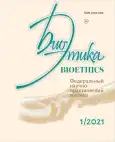DESYNCHRONIZATION, TEMPORALITY AND ANTI-HUMANISM: THE PROBLEM OF BIOCAPITALISM STABILITY
- 作者: Petrov K.A.1
-
隶属关系:
- Volgograd State Medical University, Volgograd Medical Scientific Centre
- 期: 卷 14, 编号 1 (2021)
- 页面: 27-31
- 栏目: Theoretical bioethics
- ##submission.datePublished##: 02.06.2021
- URL: https://bioethicsjournal.ru/2070-1586/article/view/71215
- DOI: https://doi.org/10.19163/2070-1586-2021-1(27)-27-31
- ID: 71215
如何引用文章
全文:
详细
For a significant number of researchers, the theoretical and methodological prerequisite for the analysis of biocapitalism is the "local knowledge" model. It is characterized by the fact that the research position is ethically loaded: the only possible way to talk about various forms of capital is associated with the need to give the floor to representatives of social groups subjected to discrimination and exploitation. This requirement leads to the elimination of biocapital as a research problem, its transformation into a non-object. Such disregard for bio-capital leads to the impossibility of an adequate assessment of the risks associated with the development of biotechnologies. An important step towards the creation of a theory of biocapitalism is the appeal to the concept of "theoretical anti-humanism" proposed by Louis Althusser. Based on this methodological principle, biocapitalism should be considered as a set of non-objective processes based on the movement of value, whose continuity is rooted in the special modes of functioning of biotechnologies. One aspect of biotechnologies is their ability to create, modify, and control "local times" i.e., the flow rates of various processes. These opportunities become a source of profit for bio-capital. Explication of the conditions of such capital work shows that any biotechnological innovation becomes what is called in the language of actor-network theory a "point of mandatory passage" – a point of connection of the interests of a set of heterogeneous actors. Each of the actors connects their own social expectations with the existence of the technology. Thus, the desire to use oocytes frozen in the biobank suggests the need to maintain the existing technoinfrastructure. Thus, the desynchronization that occurs when using biotechnologies is a way to preserve the available method of capital production, which leads to the idea that there is no alternative to biocapitalism.
作者简介
K. Petrov
Volgograd State Medical University, Volgograd Medical Scientific Centre
编辑信件的主要联系方式.
Email: petersoncyril@yandex.ru
CSc in Philosophy, associate professor, Department of Philosophy, Bioethics and Law with the course of sociology of medicine, FSBEI HE VolgSMU MOH Russia;
senior researcher, Department of Ethical, Legal and Sociological Expertise in Medicine, Volgograd Medical Scientific Centre, petersoncyril@yandex.ru
俄罗斯联邦参考
补充文件







